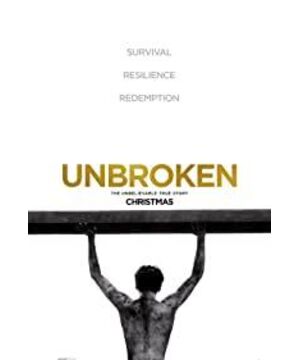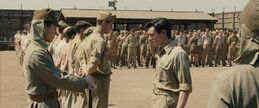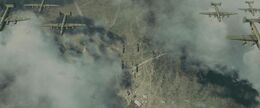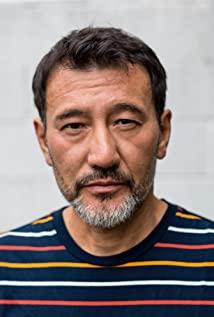- "Unbroken" The
war is a book that describes the intricate relationship between people, things and things. Today's world is a world of peace and development. War exists only in very few areas of the earth, and the legal system and rules related to war are always faded out of people's sight. However, the broad, profound and mighty concepts and regulations of international law contained in it are extremely important. Complex and worth investigating.
The World War II film "Unbroken" vividly shows us the real experience of a prisoner of war: Olympic long-distance runner and US Army Air Corps bombardier Louis Zamberini, who crashed during a search and rescue mission at sea, experienced and survived After 47 days of drifting at sea, comrade Phil was forced by hunger and cold, fighting with sharks in turbulent currents, and the threat of the Japanese army's rain-like shooting. Set foot on the homeland to reunite with family. While lamenting Louis's twisted and bizarre life and praising his resolute and strong character, it also aroused the audience's thinking about the status and treatment of prisoners of war in international armed conflicts, the illegal acts of the Japanese army and other related international humanitarian law issues.
I. The Prisoner of War Issue in International Humanitarian Law
A prisoner of war (POW) can be simply understood as "an enemy combatant controlled by an enemy". Just as war is bound by the rules of war, prisoners of war also have the status of the law of war. The definition, status, rights and obligations of prisoners of war are one of the focuses of international humanitarian law. The Hague Regulations and the 1949 Third Geneva Convention stipulate that conventional armed forces enjoy prisoner-of-war status, while militia and volunteer armies need to meet the requirements of "having the command of a responsible person, having fixed and identifying distinctive signs, openly carrying weapons, and complying with the laws and customs of war" There are four conditions to enjoy the treatment of prisoners of war; Article 44 of the Protocol Additional to the Geneva Conventions for the Protection of Victims of International Armed Conflicts (Protocol I) expands the scope to include all prisoners of war having the obligation to distinguish themselves from civilians. Prisoners of war are the defenders of a country. Abandoning the identity of the enemy, as human beings, they should also enjoy the rights of being human; as the executor of national policies, the combat behavior of prisoners of war represents the will of the country and has nothing to do with personal grievances. Combatants are captured by enemy forces Afterwards, they cannot be tried neither for their participation in hostilities nor for their violations of international humanitarian law. From the savage revenge of primitive society to the humanitarian treatment of modern civilization, attitudes towards prisoners of war and war also reflect the qualitative leap of human civilization.
Taking the story of old Louis as an example, the life situation in the prisoner of war camp that the film shows us involves many wrongful acts prohibited by customary international humanitarian law. Such as:
(1) General protection of prisoners of war. The general provisions of the Third Convention stipulate that prisoners of war shall be treated humanely at all times, with respect for person and honor, and without discrimination, the Detaining Power shall provide medical care for their living and health conditions, and shall prohibit any unlawful act that causes death or injury to prisoners of war, especially Acts of retaliation such as physical mutilation, violence or intimidation, insults. In the Japanese prisoner of war camp, Louis and Phil were poured hot tea, starved, tortured, injected with chemical experimental agents, suffered from dengue fever, dysentery and athlete's foot, and were beaten and played with endlessly. Serious departure from the provisions of protection.
Internment of prisoners of war. Part II of the Convention requires that prisoners of war shall not be confined by the Detaining Power, that prisoners of war camps must have medical care, food, hygiene and refuge, and places that can provide recreational and sports activities, and that they shall not be separated from prisoners of war. geographic location. The isolated living environment of the Dachuan concentration camp in the film can no longer be measured by the minimum standard of "suitability for human habitation". Not only does it not have the sales department and medical center required by the convention, but it is also often at risk of being bombed by bombers. Louis, who was an athlete, was played on the running field by the Japanese army, and the American soldiers were not only the enjoyers of the convention rights in recreational activities, but became a tool to entertain the Japanese guards. From Kwajalein Atoll to Big Ship Town to Omori POW Camp, Louis was separated from his comrades, and his whereabouts were not known by any state and humanitarian agencies.
The labor of prisoners of war and foreign exchanges. The Convention stipulates that prisoners of war shall not be forced to engage in humiliating and dangerous labor, to ensure working conditions and treatment, and to enjoy the right to communicate with their families. Allied soldiers "enjoyed" the unpaid work of cleaning cesspools and high-load coal mines for more than ten consecutive hours. The scene where Louis held the beam high and fought against Watanabe Hiromitsu was regarded as a classic part of the film. "There are only breathing dead people in the prisoner of war camp." The prisoners of war lost the opportunity to communicate with the outside world and endured the predicament of life and death.
(2) Serious breach of the Convention. The four Geneva Conventions and three Additional Protocols are the core framework of international humanitarian law, and the number of States parties is second only to that of the United Nations Charter. Among them, the Third Geneva Convention is the most comprehensive international convention stipulating the status and treatment of prisoners of war, covering all aspects of prisoners' clothing, food, shelter, and transportation. Intentional killing, torture, biological experiments, forced labor and deprivation of legal trials are serious damages expressly determined by the Third Convention. the conduct of the convention. Comparing the film and the articles, the huge gap in the status and treatment of prisoners of war in our hearts is extremely shocking. "Pacta sunt servanda" is not an empty phrase, it binds all contracting parties to be responsible for their actions at all times. Customary IHL rules are the crystallization of the common aspirations and wisdom of peace-loving and security-loving human beings all over the world. IHL cannot prohibit the right of states to resort to war and conflict (jus ad bellum). Strong ships, sharp guns and mine bombs, regardless of the nature of the war, just or not, the rules are only to mitigate the disasters brought about by the war. The core goal of the IHL is to protect the victims of war and armed conflict by establishing norms that limit the methods of warfare. (jus in bello), which is different from the consideration of regional and specific interests such as bilateral and multilateral conventions, but focuses on the well-being of peace and stability of all mankind. The principles of neutrality, proportionality, prohibition of retaliation and avoidance of unnecessary suffering) and humanitarian aid are the guidelines for international humanitarian protection. It is precisely because of the IHL's non-political and humanistic nature that it pursues equality and neutrality, more and more countries are attracted. Consciously accept and obey. Japan did not treat prisoners of war in accordance with the provisions of the Geneva Convention. They believed that they were slaves. In the original novel, it is written that the discipline officer of the Omori prisoner of war camp, Hiromitsu Watanabe, said that he did not understand the Geneva Convention. Tell him, "This is not Geneva, this is Japan". As an important contracting party to international conventions, Japan's despicable actions in disregard of international commitments and national responsibilities are simply outrageous.
The traditional IHL concept believes that resorting to war is a natural and legitimate right of national sovereignty, and the state has the right to judge whether to launch war and challenge it. After the Paris Convention on Non-War, mankind began to prohibit the use of war as a method of resolving international disputes and promoting national policies. tool. Some people think that the history of human beings is as long as war. The history of war is the evolutionary history of human civilization. When the conflict of interests of human beings reaches a certain stage, it will become war, and war will inevitably be accompanied by criminal acts. Avoid war, just as you can't predict tomorrow's cloudy sky. Perhaps the greatest destructiveness of war is not the destruction of life and living homeland, but the brutal trampling of human civilization. That is why the international community must unite and do something to reduce irreparable mistakes.
2. The Japanese nation's view of war , the
emperor, bushido, militarism, and feudal hierarchy, these keywords are often used to describe the historical characteristics of the Japanese nation. During World War II, Japan perfectly demonstrated the spirit of extreme nationalism. The country's view of war completely deviates from the world's mainstream view of war. While criticizing the shameless humanity of the Japanese army, the film also hides the direct impact of the political system and social culture on a country and society. Schramm, an American communication scholar, said in his semiotic interaction theory that interpersonal communication is all symbolic interaction, and culture is such a symbol that conveys common values. The formation of the inherent economic structure of class inequality. Japan is deeply influenced by the emperor and bushido culture, and all the people are soldiers and well-trained. The humane war practices that have been widely recognized by Western countries seem to be inapplicable in Japan. They have always believed that only Japan is the only country in the world regardless of race and morality. The superior nation, only God can judge Japan and the emperor, there is such a proverb in Japan: "Every bullet should be filled with imperialist belief, every bayonet should shine with the brilliance of national morality", they are afraid of shame, Considering dignity as oxygen, water and food, the hierarchy of emperor, samurai, agriculture and industry, samurai is a symbol of dignity, and "big bird" is an excellent result cultivated by this military culture.
It is not easy to study culture across history, and it is even more difficult to study culture across regions. The author Ruth described in "Chrysanthemums and Swords" that Japanese children are instilled with the concept of "shame culture" from an early age: you must respect yourself. Cultural education can legitimize and naturalize forms of inequality, and the citizens have strong prejudice against prisoners of war because they are indoctrinated by the government's extreme idea that "it is better to die and die with honor" by the government, which contributes to Japan's violation of the treaty. The arrogance of the obligatory cruelty and cruelty to prisoners of war. Beauty-loving and militaristic, etiquette and self-respecting and aggressive, new-loving and stubborn, obedient and unruly, the national character brewed by this culture is dual, the social system is hierarchical, and Japan is very regional. The concept of war is full of individuality in the wave of globalization. After analyzing this, it is not difficult to understand the motivation behind why Japan launched a war of aggression, carried out horrific massacres and abused prisoners of war. Economic globalization requires peaceful exchanges and coexistence among characteristic cultures, and the general trend of world peace and development also earnestly calls on the emperor to step down from the altar and go among the common people. Facing the history squarely, we can have a bright future.
3. The merits and virtues of international humanitarian organizations
The International Committee of the Red Cross (ICRC) is undoubtedly the best international organization for the protection and assistance of victims of war and armed conflict. This private society, with its international mission, is committed to promoting the spirit of humanity, promoting the dissemination, universal respect and maintenance of IHL in various countries, and promoting the implementation of humanitarian law in the country. Its identities as neutral groups and mediators are respected and recognized by the state. For the protection of prisoners of war, the Red Cross can act as a representative of the protectorate to visit all those in need, including prisoners of war, and provide assistance in all aspects; there are also various rescue agencies that carry out emergency rescue missions around the world, such as the United Nations Security Council, the UNHCR, children Foundations, etc., and even some unknown NGOs, large and small, are also contributing their own strength. Ms. Han Feiye, who is the head of the international emergency rescue organization, once said, "Joining the international rescue team makes me feel my heartbeat and makes my blood boil." . The film director Angelina Jolie herself is also the UNHCR Goodwill Ambassador and the Special Envoy of the High Commissioner for Refugees. The shooting of this film can be said to be a "homework" she submitted to the world humanitarian cause; The rescue of 3,700 Allied civilians and prisoners of war at the university is seen as one of the most gripping moments of the Pacific War. Rescue our fellow citizens is something to be proud and gratifying in life, because they too have flesh and blood, just like us.
The ad hoc international criminal tribunal, the Tokyo International Tribunal, conducted a century-long trial on Class A war criminals represented by Hideki Tojo. There were three main crimes: crimes against peace, war crimes and crimes against humanity. The crime of destroying peace is the most serious crime against human beings. The burning and killing of civilians and the torture of prisoners of war are one of the objective manifestations of war crimes. The crime against humanity is a new crime proposed by the Nuremberg and Tokyo courts. prevention. The establishment of an ad hoc criminal court is not only a requirement for liquidating war crimes, but also a preparation for alerting and preventing new wars. It is the duty of these international judicial institutions to protect the right of the prosecution and the defense to make a fair statement and to silence the absurd and exaggerated remarks of war criminals with facts. After Japan's unconditional surrender, General MacArthur carried out peaceful military occupation and friendly transformation of Japan, and rescued Japan from the shadow of war to rebuild its homeland. The spirit of dedication, the world-famous non-war clause in the "Three Principles of Amendment to the Constitution" proposed by him: the people will never give up war as the sacred power of the country, and never use or threaten the use of force as a means of resolving international disputes. It is the UN A manifestation of the aims and objectives advocated by Charter and IHL.
4. China and International Humanism
Since the approval of the IHL and its membership in the ICRC, the treatment of prisoners of war by the Chinese army has been in line with the provisions of humanitarian law and has been recognized by the world humanitarianism. Complying with the Geneva Conventions of 1949 and the Additional Protocols of 1977, and working with the ICRC to encourage all countries to ratify the treaties and fulfill their obligations under the treaties, is our country's consistent practice and future hope. The progress of history lies in the reckoning and introspection of the atrocities of the war. The Chinese nation, who was deeply injured by the war, was also scarred. The massacre and rape of Nanjing by the Japanese army was appalling, including 90,000 prisoners of war. Let the truth of Japanese atrocities wake up generation after generation. The right to speak has always been fair. We have always had the right to speak in the modern international arena, but we have not yet figured out what to say and how to say it. my country's international humanitarian cause must come out of the historical mood, neither pessimistic nor overly idealistic, neither overemphasizing the enemy or ourselves, but also keeping a clear head at all times. We must maintain our own things in peace and continue to develop under the premise of peace, and war has also created more opportunities and opportunities for us. Master international laws, give full play to the advantages of major powers in international organizations, and encourage young and outstanding international law students not to give up their efforts for the cause of international humanitarianism, and not to be bystanders to the world.
5. Summary and reflection
The mistreatment of prisoners of war by the Japanese army was one of the most brutal incidents of World War II. MacArthur, the Supreme Commander of the Allied Powers in the Japanese Occupied Zone, sent the golden pen to sign the surrender letter to two good officers who had lived in prison for three years as a prisoner of war for him. Not only because of his own guilt, but also hope that prisoners of war like them will attract the attention of the world and regaining dignity; the world's greatest human rights defender, anti-apartheid leader Mandela, after 27 years in prison, used tolerance to defuse ethnic hatred and made the world respect him. Soldiers deserve respect and protection, and everything is unknown when they go to the battlefield, not to mention the warriors who finally forgave the "big bird" like old Louis. The abuse of prisoners of war trampled on human rights and degraded human dignity. At the age of 97, Louis had experienced too much pain and passed away peacefully, and he could not help feeling the wonder of fate. Thank you Henry Dunnan for launching the Red Cross movement more than a century ago for the benefit of mankind for generations to come. Thank you IHL for providing a code of conduct for dealing with war issues. Thank you brave men like old Louis for their stories of perseverance and inspiring a generation. Another generation, thanks for the vivid portrayal of good books and movies that walk the heart and respect history. Although the rules cannot guarantee anything, we still have to continue to wave our flags. May the deceased soldiers be peaceful and prisoners of war will no longer be treated inhumanly.
View more about Unbroken reviews











